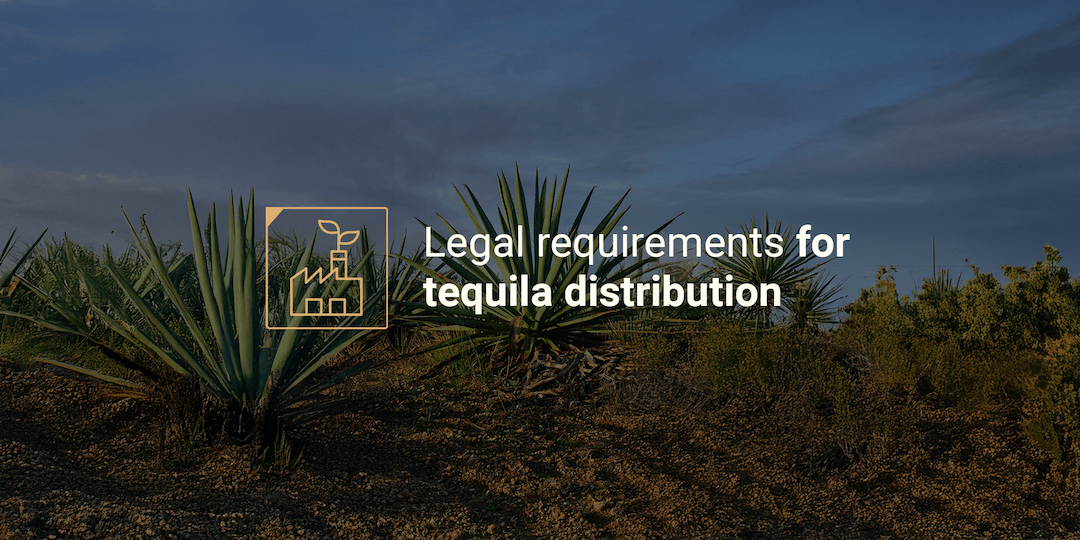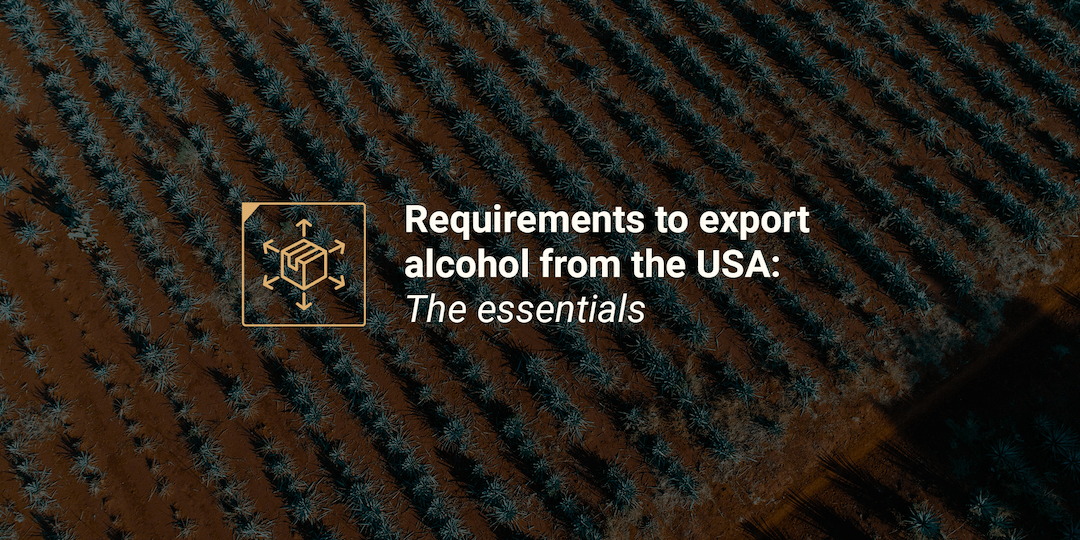Tequila label requirements and regulations
Understanding tequila label requirements is vital for both producers and consumers.
For producers, it ensures compliance with Mexican regulations, while consumers gain valuable insights into the tequila's production, age, and authenticity.
These regulations, outlined in the Norma Oficial Mexicana (NOM), guarantee that the tequila meets strict quality standards and provides essential information about its origin and characteristics.
In this guide, we'll help you navigate the complexities of tequila labeling, ensuring you have all the information you need to ensure your product meets all necessary requirements as a producer.
Essential information on tequila labels
Tequila labels serve as a window into the spirit's soul, offering vital information about its origin, production, and characteristics.
Each element on the label plays a crucial role in ensuring transparency and consumer confidence.
Let's delve deeper into the essential information you'll find on every tequila bottle:
1. The word “tequila”
- The cornerstone of identity: The word “Tequila” holds a place of prominence on every label. It signifies that the spirit within adheres to the strict production standards and regulations set forth by the Mexican government.
- Protected Designation of Origin: Similar to Champagne or Scotch Whisky, “Tequila” is a protected term, ensuring that only spirits produced in specific regions of Mexico using specific methods can bear this name. This geographical indication guarantees the tequila's authenticity and connection to its terroir.
- Assurance of authenticity: For consumers, the presence of the word “Tequila” guarantees that they are purchasing a genuine product, not an imitation or substitute. It acts as a seal of approval, assuring the tequila's quality and adherence to tradition.
2. Alcohol content
- Transparency is key: The alcohol content, usually expressed as a percentage of alcohol by volume (% Alc. Vol.), is a mandatory element on tequila labels. This information is crucial for consumer safety and responsible consumption.
- Consumer awareness: By knowing the alcohol content, consumers can make informed decisions about how much tequila to consume and understand its potential effects. This empowers individuals to enjoy tequila responsibly and avoid excessive consumption.
- Regulatory compliance: The accurate declaration of alcohol content is also essential for meeting both domestic and international trade regulations. It ensures that the tequila adheres to legal standards and can be sold and distributed across borders.

3. Net content
- Quantity matters: The net content, stated in milliliters or liters, informs consumers about the volume of tequila contained within the bottle. This allows for fair comparison between different brands and sizes, ensuring that consumers get what they pay for.
- Fair trade practices: Clearly stating the net content prevents deceptive practices and ensures that consumers are not misled about the quantity of tequila they are purchasing. It promotes transparency and fairness in the marketplace.
- International standards: The declaration of net content adheres to international labeling conventions, facilitating global trade. This consistency allows for easy comparison and understanding of tequila products across different markets.
4. NOM Identifier
- The mark of authenticity: The NOM (Norma Oficial Mexicana) identifier is a unique number assigned to each certified tequila producer. This number serves as a crucial link between the tequila and its origin.
- Traceability and quality assurance: By including the NOM identifier, producers provide a means for traceability and quality assurance. Consumers can use this number to verify the authenticity of the tequila and learn more about the distillery where it was produced.
- Consumer confidence: The NOM identifier acts as a seal of approval, assuring consumers that the tequila has been produced under the watchful eye of Mexican authorities and meets the required quality standards.
5. 100% Agave tequila
- The purest expression: The designation “100% agave tequila” is reserved for tequilas made exclusively from the sugars of the blue agave plant. This signifies a commitment to purity and tradition.
- No added sugars: Unlike mixto tequilas, which can contain up to 49% sugars from other sources, 100% agave tequila guarantees that no additional sugars or additives have been used in the production process.
- Premium quality: Tequila labeled as 100% agave is often considered to be of higher quality due to its focus on the pure agave flavor. It often commands a premium price and is sought after by connoisseurs.
6. Category and class
Like other alcoholic beverages, tequila is classified into different categories based on its aging period.
Each category offers a unique flavor profile and experience, catering to diverse palates:
- Blanco (Silver): Unaged or aged for less than two months, offering a vibrant, agave-forward flavor. This category showcases the pure essence of the agave plant, with its bright, herbaceous notes.
- Reposado: Aged for a minimum of two months but less than a year in oak barrels, resulting in a smoother, more complex taste. The oak aging imparts subtle notes of vanilla, caramel, and spice, adding depth and character to the tequila.
- Añejo (Aged): Aged for at least one year but less than three years in oak barrels, showcasing a rich, mellow character with notes of wood and vanilla. The extended aging process creates a smoother, more refined spirit with a lingering finish.
- Extra Añejo (Ultra Aged or Extra Aged): Aged for a minimum of three years in oak barrels, delivering an exceptionally smooth and sophisticated spirit with deep complexity. This category represents the pinnacle of tequila aging, with its rich mahogany color and layered flavors of dried fruits, nuts, and chocolate.
7. Identification of the lot
- Traceability and quality control: In the tequila label, it’s important to add the lot to which it belongs or batch number. This enables producers to track specific batches of tequila throughout the production and distribution process.
- Consumer information: For the curious consumer, the lot number can provide additional insights into the specific production run of their tequila. It can be used to learn more about the agave harvest, production methods, or even the specific barrels used for aging.
8. Producer and bottler information
The name and address of the producer or bottler are essential for accountability and transparency.
This information allows consumers to identify the source of the tequila and contact the company if they have any questions or concerns.
By providing their contact information, producers invite consumers to connect with their brand and learn more about their story.
It fosters a sense of trust and builds a relationship between the producer and the consumer.
9. “Hecho en Mexico”
The phrase “Hecho en Mexico” means “Made in Mexico” is a proud declaration of the tequila's origin and heritage.
It signifies that the tequila has been crafted in the heart of Mexico, where the agave plant thrives and the tradition of tequila-making runs deep.
This phrase reinforces the authenticity and adherence to the strict production of tequila standards associated with its place of origin.
It guarantees that the tequila has been produced within the designated regions of Mexico using traditional methods.
10. Health information and warnings
- Responsible consumption: Tequila labels may include health warnings and information related to responsible alcohol consumption. These warnings serve as a reminder to enjoy tequila in moderation and to avoid excessive drinking.
- Allergen information: In some cases, labels may also highlight potential allergens, such as sulfites, for consumer safety. This allows individuals with allergies or sensitivities to make informed choices and avoid potential adverse reactions.
- Legal compliance: The inclusion of health warnings and allergen information ensures that producers meet the requirements set forth by health legislation and other legal provisions applicable to alcoholic beverages. It demonstrates a commitment to consumer safety and responsible production practices.
In conclusion, tequila labels are a treasure trove of information, providing valuable insights into the spirit's origin, production, and characteristics.
By understanding the essential elements on a tequila label, you can make informed choices, appreciate the craftsmanship behind each bottle, and savor the rich heritage of this iconic Mexican spirit. 
Additional labeling considerations
Brand name and logo
- The face of the brand: The brand name and logo are central to a tequila's identity. They serve as visual cues that consumers use to recognize and differentiate between various brands.
- Building brand recognition: Consistent use of the brand name and logo across all marketing materials and touchpoints helps to build brand recognition and loyalty.
- Conveying brand values: The design and style of the brand name and logo can also convey the brand's values and personality.
Optional information
While certain information is mandatory on tequila labels, producers have the freedom to include additional details that enhance the consumer experience and tell the brand's story.
Some of the optional information that may be included on tequila labels are:
- Agave source: Producers may choose to highlight the specific region or estate where the agave was grown. This information can be particularly appealing to consumers who value terroir and the unique characteristics that different agave growing regions impart on the tequila.
- Tasting notes: Descriptive tasting notes can entice consumers and offer a glimpse into the tequila's flavor profile. These notes may highlight the aromas, flavors, and finish of the tequila, guiding consumers in their selection process.
- Limited editions and special releases: For special releases or limited editions, producers may use unique labeling designs or additional information to highlight the exclusivity and collectability of these bottlings.
Export requirements
Tequila's global popularity means that many producers export their products to international markets.
However, exporting tequila often involves additional labeling considerations to comply with the regulations of different countries.
Some of the common export requirements that may impact tequila labels include:
- Language requirements: Some countries mandate that labels be printed in the local language or include translations of key information.
- Import and distribution information: Export labels may also need to include information about the importer or distributor in the destination country. This facilitates traceability and ensures compliance with local trade regulations.
- Tax stamps and seals: Some countries require the use of tax stamps or seals on imported alcoholic beverages. These serve as proof of tax payment and help to prevent the sale of counterfeit products.
It is important for producers to consider information required by other legal provisions applicable to alcoholic beverages and understand the specific labeling requirements of each country they intend to export to.
Failure to comply with these regulations can result in delays, fines, or even the rejection of shipments.

Partnering with an expert: streamlining your tequila labeling
Navigating the complexities of tequila labeling and export can be a daunting task, especially for new brands or those unfamiliar with the intricacies of Mexican regulations and international trade.
This is where partnering with an expert like Dialce can prove invaluable.
Comprehensive tequila solutions
Dialce offers a range of services designed to streamline your tequila journey, from sourcing and production to labeling and export.
Their expertise covers every aspect of the tequila industry, ensuring that your product meets the highest quality standards and complies with all relevant regulations.
- Premium bulk tequila: Dialce provides access to a wide selection of high-quality bulk tequila, allowing you to choose the perfect base for your brand.
- Labeling expertise: Their team of experts can guide you through the labeling process, ensuring that your labels are compliant, informative, and visually appealing. They can help you navigate the complexities of Mexican NOM regulations and any additional requirements for export markets.
- Export facilitation: Dialce's extensive network and experience in international trade can simplify the export process. They handle logistics, documentation, and customs clearance, allowing you to focus on building your brand and expanding your reach.
Benefits of partnering with Dialce
- Time and cost savings: Their expertise and streamlined processes can save you valuable time and resources, allowing you to focus on other aspects of your business.
- Market access: Dialce's knowledge of international markets can help you identify opportunities and expand your brand's reach.
- Quality assurance: Their commitment to quality ensures that your tequila meets the highest standards, from production to export. With Dialce's tequila distillery facilities, which combine traditional craftsmanship with modern techniques, every bottle of tequila produced is guaranteed to uphold the excellence and authenticity that the brand is known for.
By partnering with an expert like Dialce, you can turn your tequila vision into a reality.
They provide the support and guidance you need to navigate the complexities of the industry, allowing you to focus on what you do best – crafting exceptional tequila.

Ensuring compliance and building trust through tequila label requirements
Adhering to tequila label requirements is not just a legal obligation; it's a commitment to transparency, consumer trust, and the integrity of the tequila industry.
By providing accurate and comprehensive information on your labels, you empower consumers to make informed choices and appreciate the craftsmanship behind each bottle.
For those navigating the complexities of tequila labeling and export, consider partnering with an expert like Dialce, our bulk tequila assures quality, consistency, and compliance with all industry regulations.
Their comprehensive solutions, from sourcing bulk tequila to handling export logistics, can streamline your journey and ensure your tequila reaches its full potential.
Ready to embark on your tequila adventure? Contact us today and discover how our expertise can elevate your brand and open doors to new markets.
Learn more about the bulk tequila industry:
- Bulk tequila suppliers from Mexico: meet the best 3
- The 10 best tequila distilleries in Mexico
- How to become a liquor importer: your step-by-step guide







